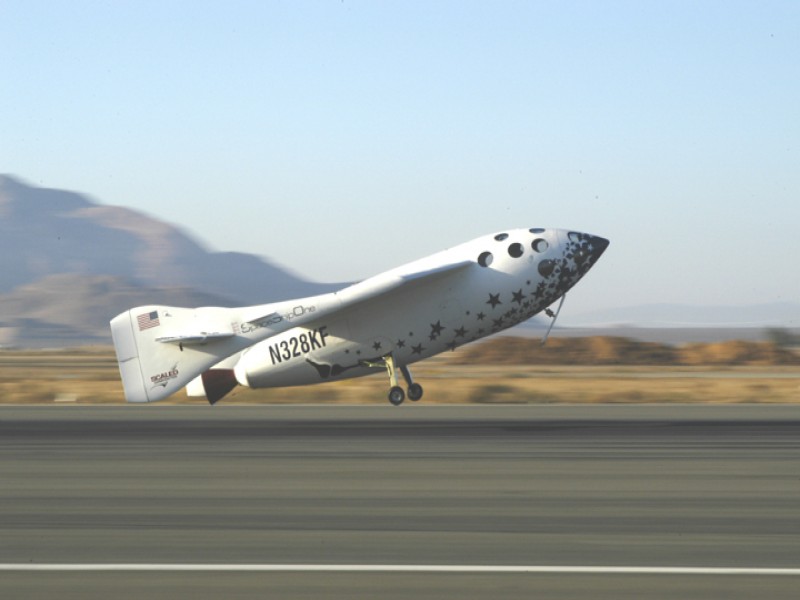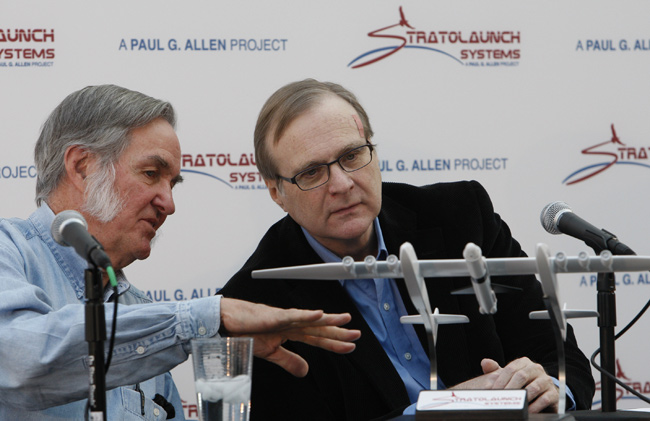Paul Allen: Billionaire Backer of Private Space Ventures
Paul Allen was a co-founder of Microsoft, serial entrepreneur and a prominent investor in several other businesses, including companies in the space industry. He is best remembered for being the sole financial backer of SpaceShipOne, an experimental private spacecraft. Allen's interest in and support for the space-travel industry continued until his death.
Microsoft years
Allen was born in 1953 in Seattle. He met Bill Gates at Lakeside School, a private school in that city, where the two bonded over their shared passion for computers. Allen attended Washington State University and dropped out to work for Honeywell in Boston. At the time, Gates was also in Boston, attending Harvard University, according to Allen's biography. It was Allen who suggested that Gates drop out of school and work with him so that both could make their own way in the computer industry.
In 1975, when Allen was just 22 years old, he and Gates founded Microsoft (or as it was then known, "Micro-Soft"). The school programming buddies were spurred to start their own softwarecompany after the first personal computer kit, the Altair 8800, came out in 1974.
Gates and Allen were sure they could make a better operating system than the one Altair was using at the time. The pair convinced the president of Altair's manufacturer, Micro Instrumentation and Telemetry Systems (MITS), to incorporate their system.
The watershed moment for Microsoft came in 1981: IBM's first personal computer hit the public market, with Microsoft's MS-Disk Operating System (MS-DOS) running it. This contract ended up being a blockbuster deal for Microsoft and was the determining factor behind Allen's wealth.
However, Allen's health took a turn for the worse the next year: In 1982, he was diagnosed with Hodgkin's lymphoma, but successfully went into remission after receiving radiation treatments. Decades later, in 2009, Allen battled and beat back non-Hodgkin's lymphoma.
According to Allen's biography, "Idea Man: A Memoir" (A Perigree Book/Penguin Group, 2011), Gates tried to dilute Allen's financial share of Microsoft in the 1980s. While Gates disagrees with the version of events that was portrayed in the biography, what is known for sure is that Allen left Microsoft in the company's early years to pursue other ventures.
Breaking space news, the latest updates on rocket launches, skywatching events and more!
In 1986, Allen co-founded Vulcan, a portfolio company for his business and charity work. It was a venture that he was to hold until his death. Afterward, his estate took over its management. (Allen said in media reports that Vulcan is not a nod to the fictional planeton the TV show "Star Trek," but a reference to the Roman god.)
Space ventures
In 2000, Allen brokered an agreement with aerospace designer Burt Rutan to develop a private spacecraft that would compete for the Ansari X-Prize. The prize promised $10 million to the first nongovernmental organization to fly a spaceship above Earth's atmosphere – twice – and return to Earth safely. With Allen's financial support, Rutan and his company, Scaled Composites, built a revolutionary space plane they called SpaceShipOne.
SpaceShipOne won the Ansari X-Prize in 2004, but the next stage in the spaceship's development passed to another rich entrepreneur: Richard Branson. The charismatic Virgin brand founder aimed to establish a space-tourism company, Virgin Galactic, with a successor spacecraft he called SpaceShipTwo. SpaceShipTwo has been tested multiple times within Earth's atmosphere in preparation for eventually bringing paying passengers into space.
In late 2011, Allen announced he and Rutan would team up again under the name Stratolaunch Systems. Their goal this time was to build a gigantic aircraft that could send cargo, satellites and people to space. [Infographic: Biggest Aircraft in History to Launch Spaceships into Orbit].
Allen also donated more than $30 million to the Allen Telescope Array, a 42-dish network of radio telescopes in northern California. SETI (Search for Extraterrestrial Intelligence) uses the network to listen for possible extraterrestrial signals.
Allen's legacy
Allen announced in October 2018 that he was receiving treatment once more for non-Hodgkin's lymphoma. He died from complications of the disease on Oct. 15.
At the time of his death, Allen had an estimated net worth of $20.3 billion, according to Forbes. He donated roughly $2 billion of his fortune, Forbes reported, including $500 million to the Allen Institute for Brain Science. Allen also founded the Allen Institute for Artificial Intelligence and the Allen Institute for Cell Science, and he owned or co-owned three professional sports teams. Allen remained highly active in the space industry and his other ventures until shortly before his death.

Elizabeth Howell (she/her), Ph.D., was a staff writer in the spaceflight channel between 2022 and 2024 specializing in Canadian space news. She was contributing writer for Space.com for 10 years from 2012 to 2024. Elizabeth's reporting includes multiple exclusives with the White House, leading world coverage about a lost-and-found space tomato on the International Space Station, witnessing five human spaceflight launches on two continents, flying parabolic, working inside a spacesuit, and participating in a simulated Mars mission. Her latest book, "Why Am I Taller?" (ECW Press, 2022) is co-written with astronaut Dave Williams.


